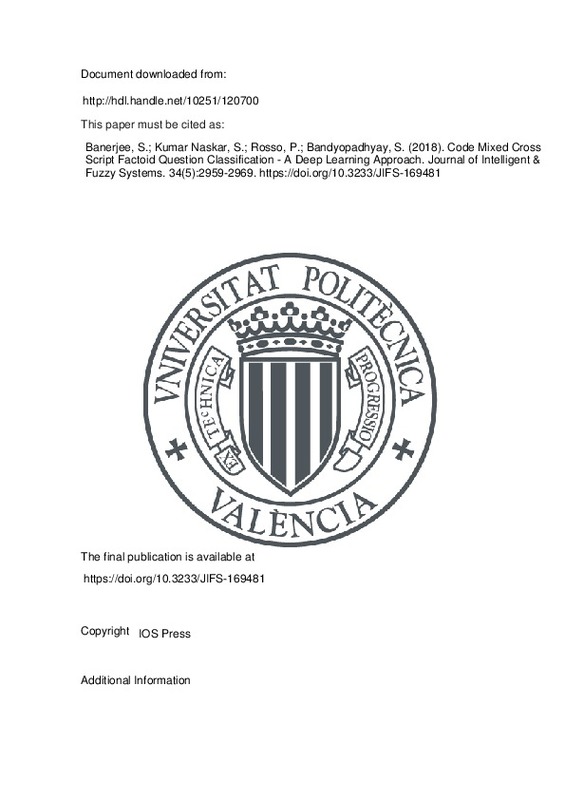JavaScript is disabled for your browser. Some features of this site may not work without it.
Buscar en RiuNet
Listar
Mi cuenta
Estadísticas
Ayuda RiuNet
Admin. UPV
Code Mixed Cross Script Factoid Question Classification - A Deep Learning Approach
Mostrar el registro sencillo del ítem
Ficheros en el ítem
| dc.contributor.author | Banerjee, Somnath
|
es_ES |
| dc.contributor.author | Kumar Naskar, Sudip
|
es_ES |
| dc.contributor.author | Rosso, Paolo
|
es_ES |
| dc.contributor.author | Bandyopadhyay, Sivaji
|
es_ES |
| dc.date.accessioned | 2019-05-19T20:02:35Z | |
| dc.date.available | 2019-05-19T20:02:35Z | |
| dc.date.issued | 2018 | es_ES |
| dc.identifier.issn | 1064-1246 | es_ES |
| dc.identifier.uri | http://hdl.handle.net/10251/120700 | |
| dc.description.abstract | [EN] Before the advent of the Internet era, code-mixing was mainly used in the spoken form. However, with the recent popular informal networking platforms such as Facebook, Twitter, Instagram, etc., in social media, code-mixing is being used more and more in written form. User-generated social media content is becoming an increasingly important resource in applied linguistics. Recent trends in social media usage have led to a proliferation of studies on social media content. Multilingual social media users often write native language content in non-native script (cross-script). Recently Banerjee et al. [9] introduced the code-mixed cross-script question answering research problem and reported that the ever increasing social media content could serve as a potential digital resource for less-computerized languages to build question answering systems. Question classification is a core task in question answering in which questions are assigned a class or a number of classes which denote the expected answer type(s). In this research work, we address the question classification task as part of the code-mixed cross-script question answering research problem. We combine deep learning framework with feature engineering to address the question classification task and enhance the state-of-the-art question classification accuracy by over 4% for code-mixed cross-script questions. | es_ES |
| dc.description.sponsorship | The work of the third author was partially supported by the SomEMBED TIN2015-71147-C2-1-P MINECO research project. | es_ES |
| dc.language | Inglés | es_ES |
| dc.publisher | IOS Press | es_ES |
| dc.relation.ispartof | Journal of Intelligent & Fuzzy Systems | es_ES |
| dc.rights | Reserva de todos los derechos | es_ES |
| dc.subject | Question answering | es_ES |
| dc.subject | Code-mixing | es_ES |
| dc.subject | Cross-scripting | es_ES |
| dc.subject | Question classification | es_ES |
| dc.subject | Deep learning | es_ES |
| dc.subject | Social media content | es_ES |
| dc.subject.classification | LENGUAJES Y SISTEMAS INFORMATICOS | es_ES |
| dc.title | Code Mixed Cross Script Factoid Question Classification - A Deep Learning Approach | es_ES |
| dc.type | Artículo | es_ES |
| dc.identifier.doi | 10.3233/JIFS-169481 | es_ES |
| dc.relation.projectID | info:eu-repo/grantAgreement/MINECO//TIN2015-71147-C2-1-P/ES/COMPRENSION DEL LENGUAJE EN LOS MEDIOS DE COMUNICACION SOCIAL - REPRESENTANDO CONTEXTOS DE FORMA CONTINUA/ | es_ES |
| dc.rights.accessRights | Abierto | es_ES |
| dc.contributor.affiliation | Universitat Politècnica de València. Departamento de Sistemas Informáticos y Computación - Departament de Sistemes Informàtics i Computació | es_ES |
| dc.description.bibliographicCitation | Banerjee, S.; Kumar Naskar, S.; Rosso, P.; Bandyopadhyay, S. (2018). Code Mixed Cross Script Factoid Question Classification - A Deep Learning Approach. Journal of Intelligent & Fuzzy Systems. 34(5):2959-2969. https://doi.org/10.3233/JIFS-169481 | es_ES |
| dc.description.accrualMethod | S | es_ES |
| dc.relation.publisherversion | https://doi.org/10.3233/JIFS-169481 | es_ES |
| dc.description.upvformatpinicio | 2959 | es_ES |
| dc.description.upvformatpfin | 2969 | es_ES |
| dc.type.version | info:eu-repo/semantics/publishedVersion | es_ES |
| dc.description.volume | 34 | es_ES |
| dc.description.issue | 5 | es_ES |
| dc.relation.pasarela | S\384156 | es_ES |
| dc.contributor.funder | Ministerio de Economía y Empresa | es_ES |







![[Cerrado]](/themes/UPV/images/candado.png)

